Report on Legislation and Ethics in Travel and Tourism Sector
VerifiedAdded on 2020/12/10
|13
|3612
|84
Report
AI Summary
This report provides a comprehensive overview of legislation and ethics within the travel and tourism sector. It begins with an introduction to the legal and regulatory framework, including the Tourism Development Act and transport laws governing surface, sea, and air travel. The report then examines the impacts of health, safety, and security legislation, as well as legislation related to equality, highlighting the importance of these principles in protecting travelers and employees. Furthermore, the report analyzes contract and consumer protection legislation, outlining the elements of a contract and consumer rights. Finally, it addresses ethical dilemmas faced by the sector and explores the role of Corporate Social Responsibility (CSR) policies. The conclusion summarizes the key findings, emphasizing the importance of adhering to legal and ethical standards within the tourism industry to ensure fair practices and the protection of all stakeholders.
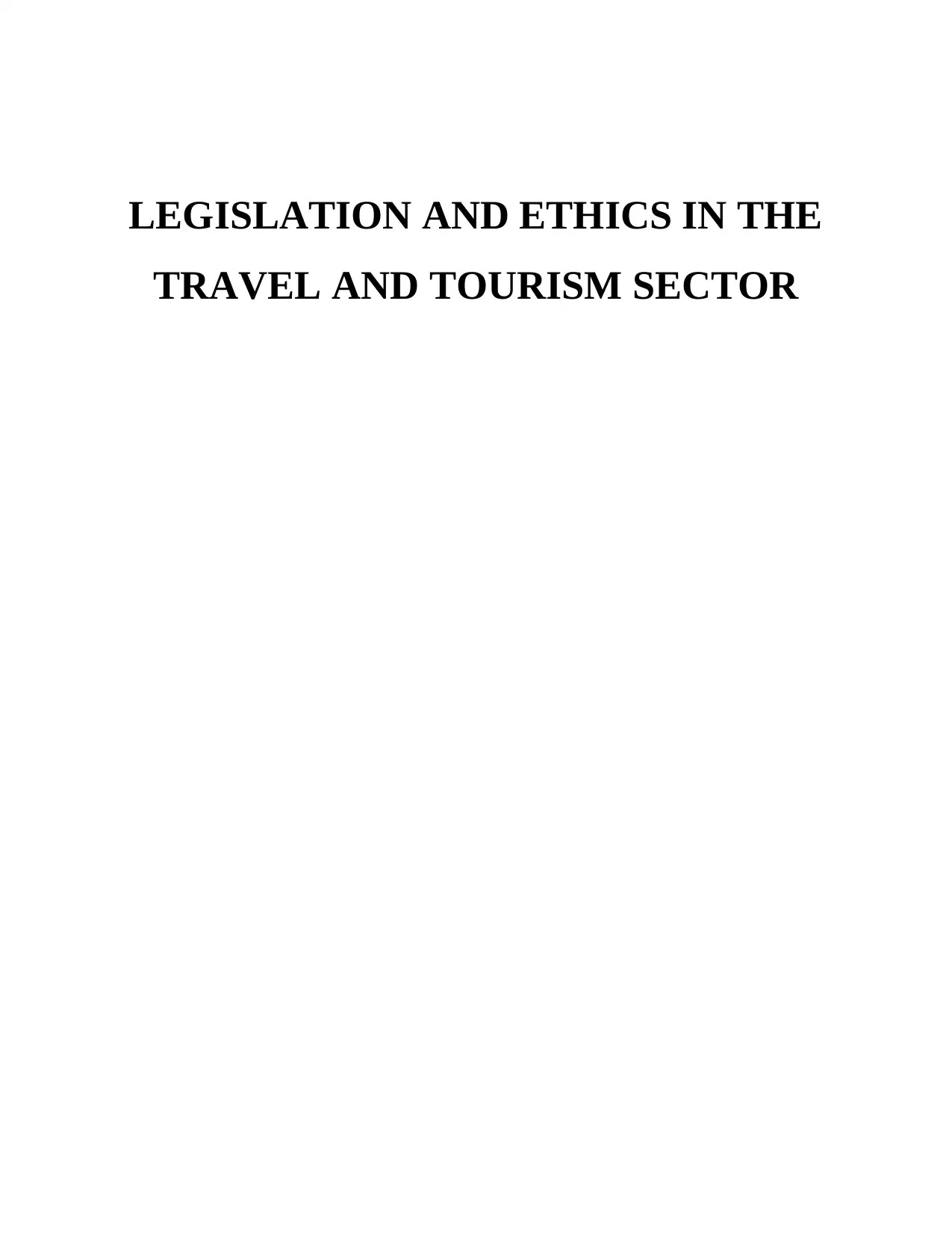
LEGISLATION AND ETHICS IN THE
TRAVEL AND TOURISM SECTOR
TRAVEL AND TOURISM SECTOR
Paraphrase This Document
Need a fresh take? Get an instant paraphrase of this document with our AI Paraphraser
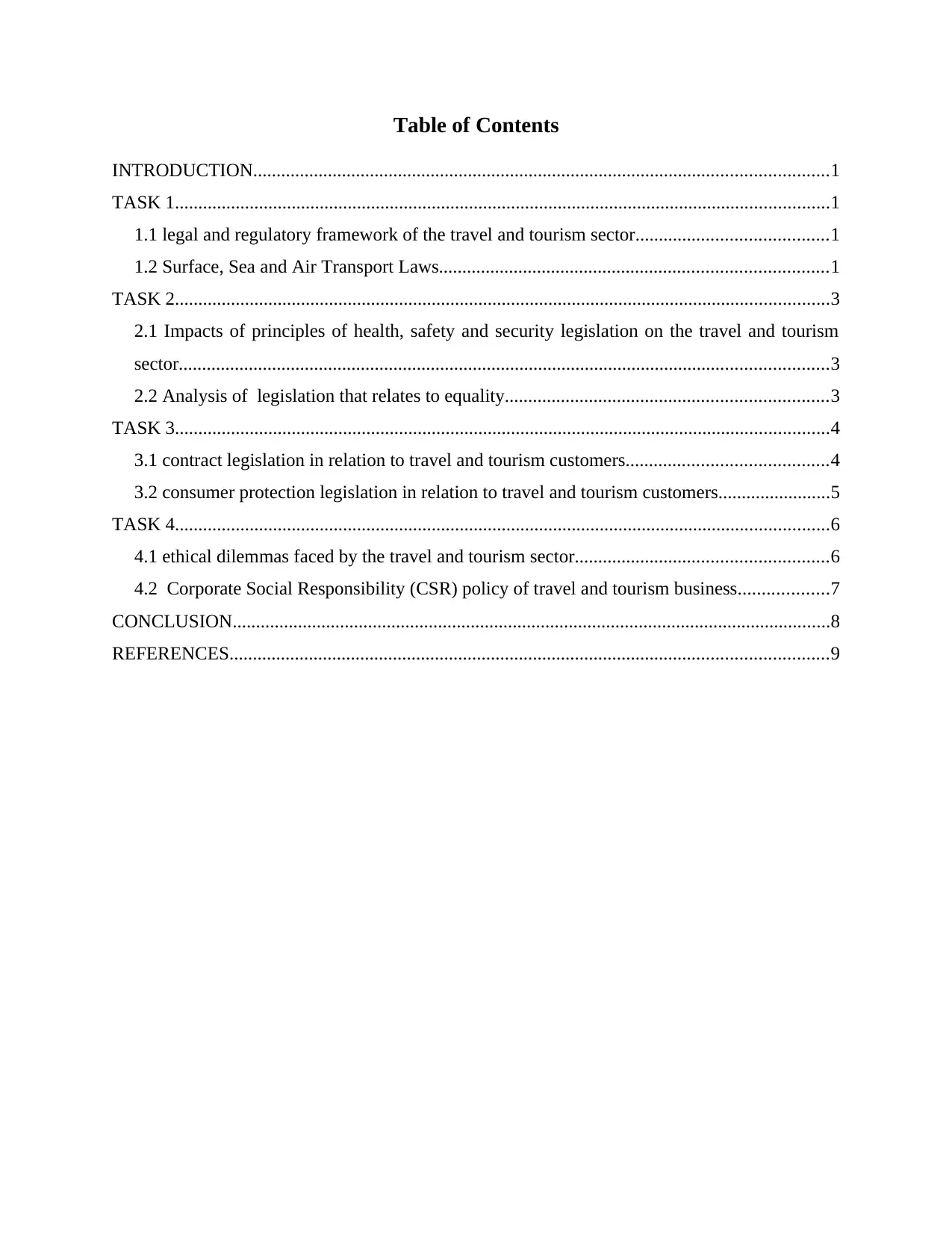
Table of Contents
INTRODUCTION...........................................................................................................................1
TASK 1............................................................................................................................................1
1.1 legal and regulatory framework of the travel and tourism sector.........................................1
1.2 Surface, Sea and Air Transport Laws...................................................................................1
TASK 2............................................................................................................................................3
2.1 Impacts of principles of health, safety and security legislation on the travel and tourism
sector...........................................................................................................................................3
2.2 Analysis of legislation that relates to equality.....................................................................3
TASK 3............................................................................................................................................4
3.1 contract legislation in relation to travel and tourism customers...........................................4
3.2 consumer protection legislation in relation to travel and tourism customers........................5
TASK 4............................................................................................................................................6
4.1 ethical dilemmas faced by the travel and tourism sector......................................................6
4.2 Corporate Social Responsibility (CSR) policy of travel and tourism business...................7
CONCLUSION................................................................................................................................8
REFERENCES................................................................................................................................9
INTRODUCTION...........................................................................................................................1
TASK 1............................................................................................................................................1
1.1 legal and regulatory framework of the travel and tourism sector.........................................1
1.2 Surface, Sea and Air Transport Laws...................................................................................1
TASK 2............................................................................................................................................3
2.1 Impacts of principles of health, safety and security legislation on the travel and tourism
sector...........................................................................................................................................3
2.2 Analysis of legislation that relates to equality.....................................................................3
TASK 3............................................................................................................................................4
3.1 contract legislation in relation to travel and tourism customers...........................................4
3.2 consumer protection legislation in relation to travel and tourism customers........................5
TASK 4............................................................................................................................................6
4.1 ethical dilemmas faced by the travel and tourism sector......................................................6
4.2 Corporate Social Responsibility (CSR) policy of travel and tourism business...................7
CONCLUSION................................................................................................................................8
REFERENCES................................................................................................................................9
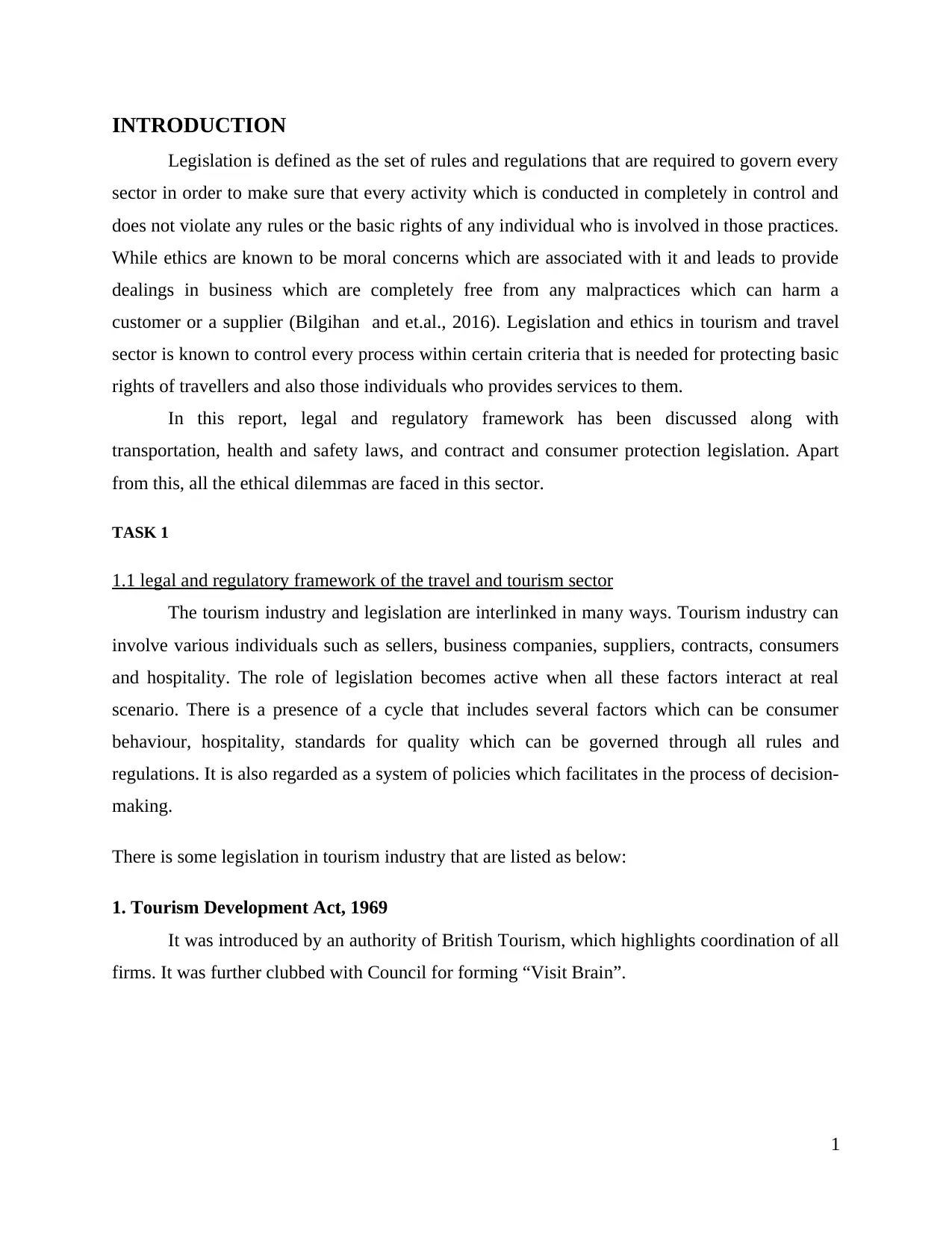
INTRODUCTION
Legislation is defined as the set of rules and regulations that are required to govern every
sector in order to make sure that every activity which is conducted in completely in control and
does not violate any rules or the basic rights of any individual who is involved in those practices.
While ethics are known to be moral concerns which are associated with it and leads to provide
dealings in business which are completely free from any malpractices which can harm a
customer or a supplier (Bilgihan and et.al., 2016). Legislation and ethics in tourism and travel
sector is known to control every process within certain criteria that is needed for protecting basic
rights of travellers and also those individuals who provides services to them.
In this report, legal and regulatory framework has been discussed along with
transportation, health and safety laws, and contract and consumer protection legislation. Apart
from this, all the ethical dilemmas are faced in this sector.
TASK 1
1.1 legal and regulatory framework of the travel and tourism sector
The tourism industry and legislation are interlinked in many ways. Tourism industry can
involve various individuals such as sellers, business companies, suppliers, contracts, consumers
and hospitality. The role of legislation becomes active when all these factors interact at real
scenario. There is a presence of a cycle that includes several factors which can be consumer
behaviour, hospitality, standards for quality which can be governed through all rules and
regulations. It is also regarded as a system of policies which facilitates in the process of decision-
making.
There is some legislation in tourism industry that are listed as below:
1. Tourism Development Act, 1969
It was introduced by an authority of British Tourism, which highlights coordination of all
firms. It was further clubbed with Council for forming “Visit Brain”.
1
Legislation is defined as the set of rules and regulations that are required to govern every
sector in order to make sure that every activity which is conducted in completely in control and
does not violate any rules or the basic rights of any individual who is involved in those practices.
While ethics are known to be moral concerns which are associated with it and leads to provide
dealings in business which are completely free from any malpractices which can harm a
customer or a supplier (Bilgihan and et.al., 2016). Legislation and ethics in tourism and travel
sector is known to control every process within certain criteria that is needed for protecting basic
rights of travellers and also those individuals who provides services to them.
In this report, legal and regulatory framework has been discussed along with
transportation, health and safety laws, and contract and consumer protection legislation. Apart
from this, all the ethical dilemmas are faced in this sector.
TASK 1
1.1 legal and regulatory framework of the travel and tourism sector
The tourism industry and legislation are interlinked in many ways. Tourism industry can
involve various individuals such as sellers, business companies, suppliers, contracts, consumers
and hospitality. The role of legislation becomes active when all these factors interact at real
scenario. There is a presence of a cycle that includes several factors which can be consumer
behaviour, hospitality, standards for quality which can be governed through all rules and
regulations. It is also regarded as a system of policies which facilitates in the process of decision-
making.
There is some legislation in tourism industry that are listed as below:
1. Tourism Development Act, 1969
It was introduced by an authority of British Tourism, which highlights coordination of all
firms. It was further clubbed with Council for forming “Visit Brain”.
1
⊘ This is a preview!⊘
Do you want full access?
Subscribe today to unlock all pages.

Trusted by 1+ million students worldwide
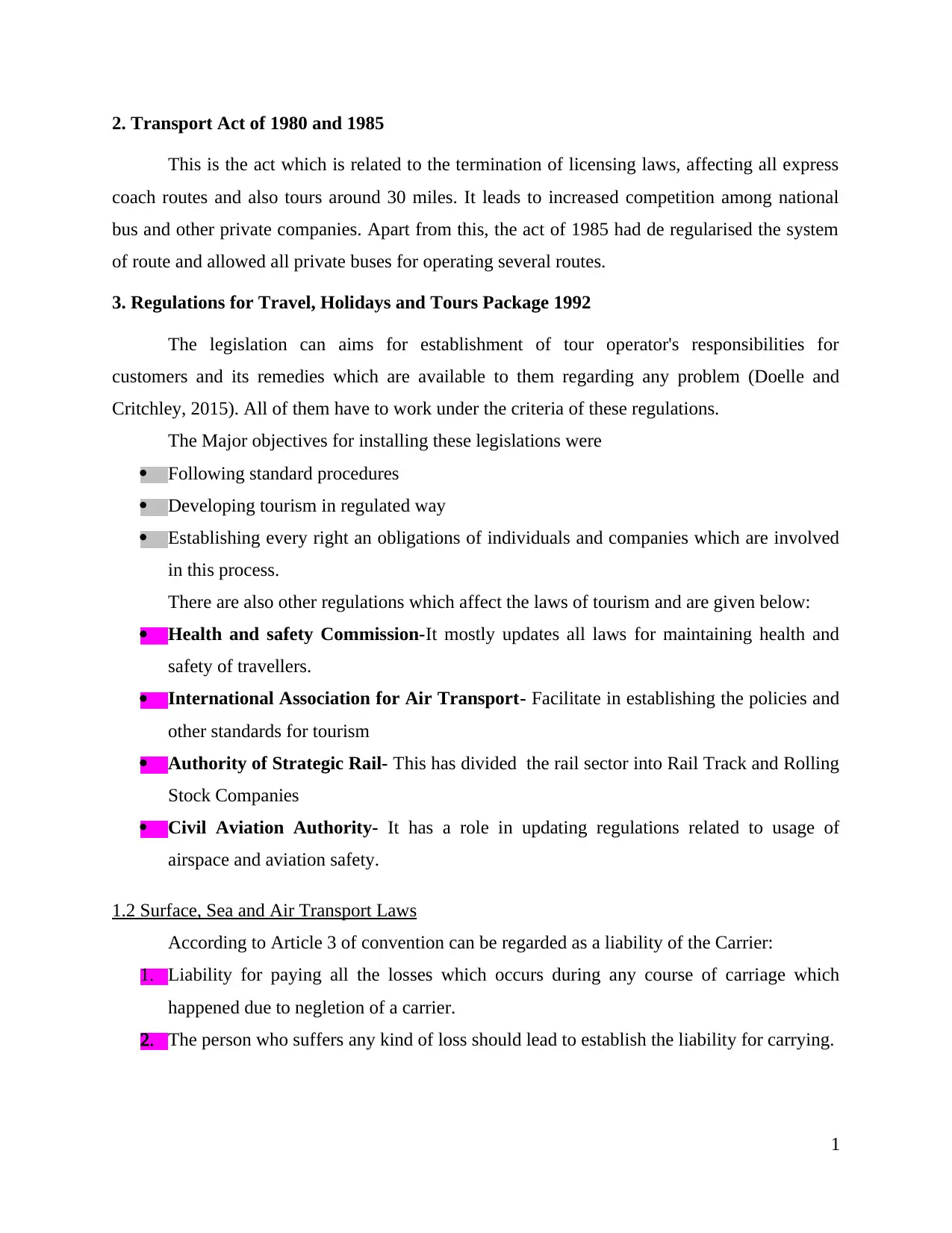
2. Transport Act of 1980 and 1985
This is the act which is related to the termination of licensing laws, affecting all express
coach routes and also tours around 30 miles. It leads to increased competition among national
bus and other private companies. Apart from this, the act of 1985 had de regularised the system
of route and allowed all private buses for operating several routes.
3. Regulations for Travel, Holidays and Tours Package 1992
The legislation can aims for establishment of tour operator's responsibilities for
customers and its remedies which are available to them regarding any problem (Doelle and
Critchley, 2015). All of them have to work under the criteria of these regulations.
The Major objectives for installing these legislations were
Following standard procedures
Developing tourism in regulated way
Establishing every right an obligations of individuals and companies which are involved
in this process.
There are also other regulations which affect the laws of tourism and are given below:
Health and safety Commission-It mostly updates all laws for maintaining health and
safety of travellers.
International Association for Air Transport- Facilitate in establishing the policies and
other standards for tourism
Authority of Strategic Rail- This has divided the rail sector into Rail Track and Rolling
Stock Companies
Civil Aviation Authority- It has a role in updating regulations related to usage of
airspace and aviation safety.
1.2 Surface, Sea and Air Transport Laws
According to Article 3 of convention can be regarded as a liability of the Carrier:
1. Liability for paying all the losses which occurs during any course of carriage which
happened due to negletion of a carrier.
2. The person who suffers any kind of loss should lead to establish the liability for carrying.
1
This is the act which is related to the termination of licensing laws, affecting all express
coach routes and also tours around 30 miles. It leads to increased competition among national
bus and other private companies. Apart from this, the act of 1985 had de regularised the system
of route and allowed all private buses for operating several routes.
3. Regulations for Travel, Holidays and Tours Package 1992
The legislation can aims for establishment of tour operator's responsibilities for
customers and its remedies which are available to them regarding any problem (Doelle and
Critchley, 2015). All of them have to work under the criteria of these regulations.
The Major objectives for installing these legislations were
Following standard procedures
Developing tourism in regulated way
Establishing every right an obligations of individuals and companies which are involved
in this process.
There are also other regulations which affect the laws of tourism and are given below:
Health and safety Commission-It mostly updates all laws for maintaining health and
safety of travellers.
International Association for Air Transport- Facilitate in establishing the policies and
other standards for tourism
Authority of Strategic Rail- This has divided the rail sector into Rail Track and Rolling
Stock Companies
Civil Aviation Authority- It has a role in updating regulations related to usage of
airspace and aviation safety.
1.2 Surface, Sea and Air Transport Laws
According to Article 3 of convention can be regarded as a liability of the Carrier:
1. Liability for paying all the losses which occurs during any course of carriage which
happened due to negletion of a carrier.
2. The person who suffers any kind of loss should lead to establish the liability for carrying.
1
Paraphrase This Document
Need a fresh take? Get an instant paraphrase of this document with our AI Paraphraser
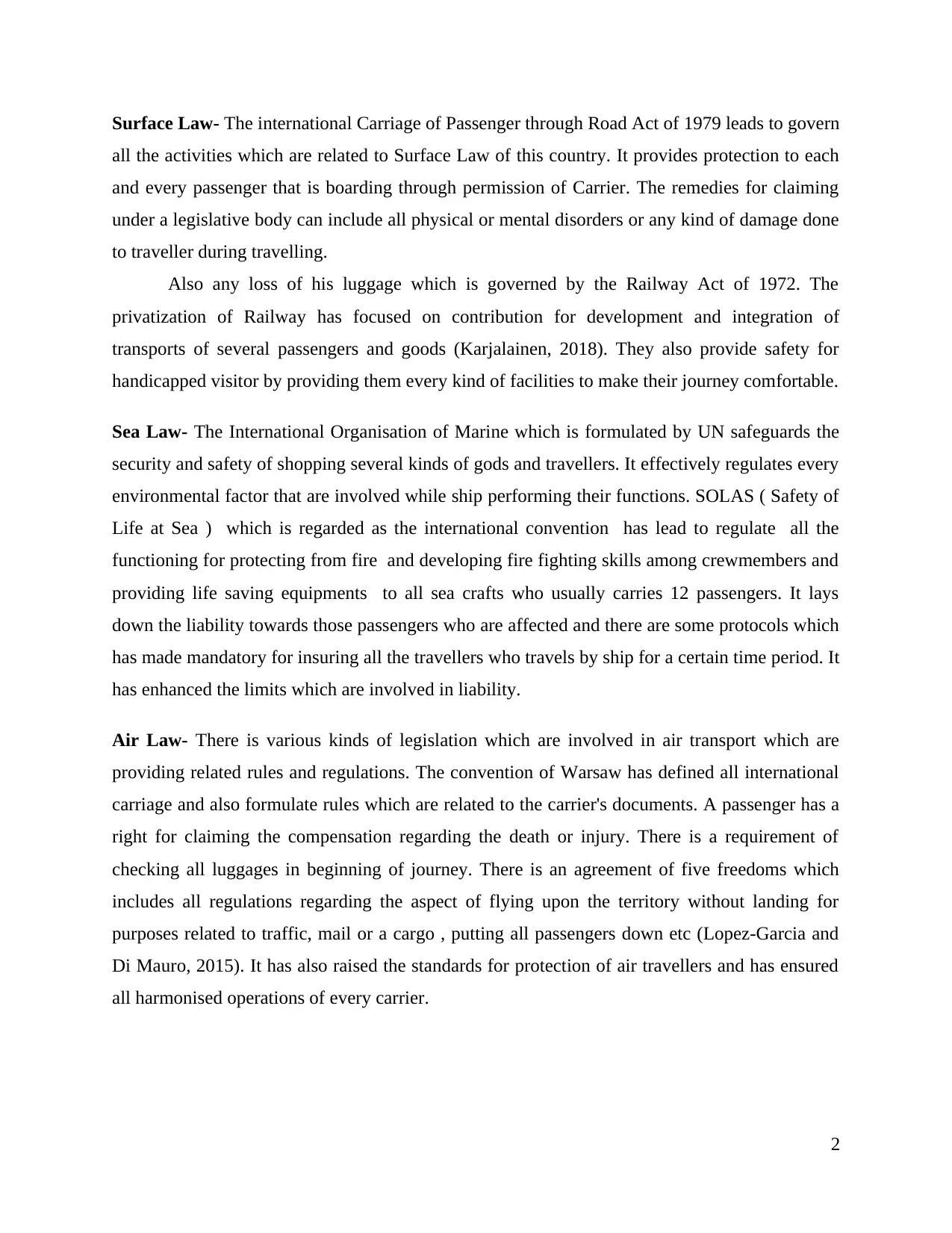
Surface Law- The international Carriage of Passenger through Road Act of 1979 leads to govern
all the activities which are related to Surface Law of this country. It provides protection to each
and every passenger that is boarding through permission of Carrier. The remedies for claiming
under a legislative body can include all physical or mental disorders or any kind of damage done
to traveller during travelling.
Also any loss of his luggage which is governed by the Railway Act of 1972. The
privatization of Railway has focused on contribution for development and integration of
transports of several passengers and goods (Karjalainen, 2018). They also provide safety for
handicapped visitor by providing them every kind of facilities to make their journey comfortable.
Sea Law- The International Organisation of Marine which is formulated by UN safeguards the
security and safety of shopping several kinds of gods and travellers. It effectively regulates every
environmental factor that are involved while ship performing their functions. SOLAS ( Safety of
Life at Sea ) which is regarded as the international convention has lead to regulate all the
functioning for protecting from fire and developing fire fighting skills among crewmembers and
providing life saving equipments to all sea crafts who usually carries 12 passengers. It lays
down the liability towards those passengers who are affected and there are some protocols which
has made mandatory for insuring all the travellers who travels by ship for a certain time period. It
has enhanced the limits which are involved in liability.
Air Law- There is various kinds of legislation which are involved in air transport which are
providing related rules and regulations. The convention of Warsaw has defined all international
carriage and also formulate rules which are related to the carrier's documents. A passenger has a
right for claiming the compensation regarding the death or injury. There is a requirement of
checking all luggages in beginning of journey. There is an agreement of five freedoms which
includes all regulations regarding the aspect of flying upon the territory without landing for
purposes related to traffic, mail or a cargo , putting all passengers down etc (Lopez-Garcia and
Di Mauro, 2015). It has also raised the standards for protection of air travellers and has ensured
all harmonised operations of every carrier.
2
all the activities which are related to Surface Law of this country. It provides protection to each
and every passenger that is boarding through permission of Carrier. The remedies for claiming
under a legislative body can include all physical or mental disorders or any kind of damage done
to traveller during travelling.
Also any loss of his luggage which is governed by the Railway Act of 1972. The
privatization of Railway has focused on contribution for development and integration of
transports of several passengers and goods (Karjalainen, 2018). They also provide safety for
handicapped visitor by providing them every kind of facilities to make their journey comfortable.
Sea Law- The International Organisation of Marine which is formulated by UN safeguards the
security and safety of shopping several kinds of gods and travellers. It effectively regulates every
environmental factor that are involved while ship performing their functions. SOLAS ( Safety of
Life at Sea ) which is regarded as the international convention has lead to regulate all the
functioning for protecting from fire and developing fire fighting skills among crewmembers and
providing life saving equipments to all sea crafts who usually carries 12 passengers. It lays
down the liability towards those passengers who are affected and there are some protocols which
has made mandatory for insuring all the travellers who travels by ship for a certain time period. It
has enhanced the limits which are involved in liability.
Air Law- There is various kinds of legislation which are involved in air transport which are
providing related rules and regulations. The convention of Warsaw has defined all international
carriage and also formulate rules which are related to the carrier's documents. A passenger has a
right for claiming the compensation regarding the death or injury. There is a requirement of
checking all luggages in beginning of journey. There is an agreement of five freedoms which
includes all regulations regarding the aspect of flying upon the territory without landing for
purposes related to traffic, mail or a cargo , putting all passengers down etc (Lopez-Garcia and
Di Mauro, 2015). It has also raised the standards for protection of air travellers and has ensured
all harmonised operations of every carrier.
2
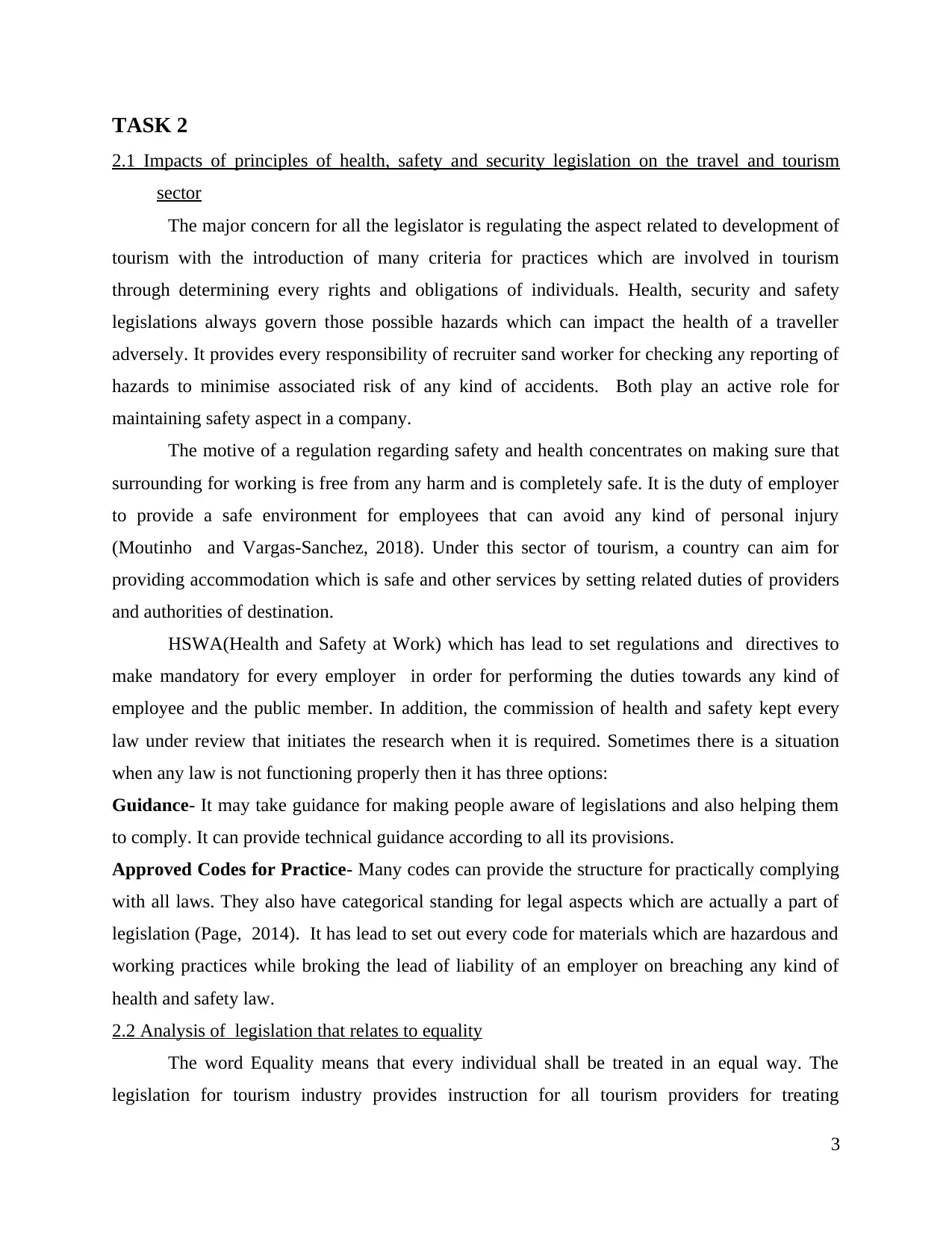
TASK 2
2.1 Impacts of principles of health, safety and security legislation on the travel and tourism
sector
The major concern for all the legislator is regulating the aspect related to development of
tourism with the introduction of many criteria for practices which are involved in tourism
through determining every rights and obligations of individuals. Health, security and safety
legislations always govern those possible hazards which can impact the health of a traveller
adversely. It provides every responsibility of recruiter sand worker for checking any reporting of
hazards to minimise associated risk of any kind of accidents. Both play an active role for
maintaining safety aspect in a company.
The motive of a regulation regarding safety and health concentrates on making sure that
surrounding for working is free from any harm and is completely safe. It is the duty of employer
to provide a safe environment for employees that can avoid any kind of personal injury
(Moutinho and Vargas-Sanchez, 2018). Under this sector of tourism, a country can aim for
providing accommodation which is safe and other services by setting related duties of providers
and authorities of destination.
HSWA(Health and Safety at Work) which has lead to set regulations and directives to
make mandatory for every employer in order for performing the duties towards any kind of
employee and the public member. In addition, the commission of health and safety kept every
law under review that initiates the research when it is required. Sometimes there is a situation
when any law is not functioning properly then it has three options:
Guidance- It may take guidance for making people aware of legislations and also helping them
to comply. It can provide technical guidance according to all its provisions.
Approved Codes for Practice- Many codes can provide the structure for practically complying
with all laws. They also have categorical standing for legal aspects which are actually a part of
legislation (Page, 2014). It has lead to set out every code for materials which are hazardous and
working practices while broking the lead of liability of an employer on breaching any kind of
health and safety law.
2.2 Analysis of legislation that relates to equality
The word Equality means that every individual shall be treated in an equal way. The
legislation for tourism industry provides instruction for all tourism providers for treating
3
2.1 Impacts of principles of health, safety and security legislation on the travel and tourism
sector
The major concern for all the legislator is regulating the aspect related to development of
tourism with the introduction of many criteria for practices which are involved in tourism
through determining every rights and obligations of individuals. Health, security and safety
legislations always govern those possible hazards which can impact the health of a traveller
adversely. It provides every responsibility of recruiter sand worker for checking any reporting of
hazards to minimise associated risk of any kind of accidents. Both play an active role for
maintaining safety aspect in a company.
The motive of a regulation regarding safety and health concentrates on making sure that
surrounding for working is free from any harm and is completely safe. It is the duty of employer
to provide a safe environment for employees that can avoid any kind of personal injury
(Moutinho and Vargas-Sanchez, 2018). Under this sector of tourism, a country can aim for
providing accommodation which is safe and other services by setting related duties of providers
and authorities of destination.
HSWA(Health and Safety at Work) which has lead to set regulations and directives to
make mandatory for every employer in order for performing the duties towards any kind of
employee and the public member. In addition, the commission of health and safety kept every
law under review that initiates the research when it is required. Sometimes there is a situation
when any law is not functioning properly then it has three options:
Guidance- It may take guidance for making people aware of legislations and also helping them
to comply. It can provide technical guidance according to all its provisions.
Approved Codes for Practice- Many codes can provide the structure for practically complying
with all laws. They also have categorical standing for legal aspects which are actually a part of
legislation (Page, 2014). It has lead to set out every code for materials which are hazardous and
working practices while broking the lead of liability of an employer on breaching any kind of
health and safety law.
2.2 Analysis of legislation that relates to equality
The word Equality means that every individual shall be treated in an equal way. The
legislation for tourism industry provides instruction for all tourism providers for treating
3
⊘ This is a preview!⊘
Do you want full access?
Subscribe today to unlock all pages.

Trusted by 1+ million students worldwide
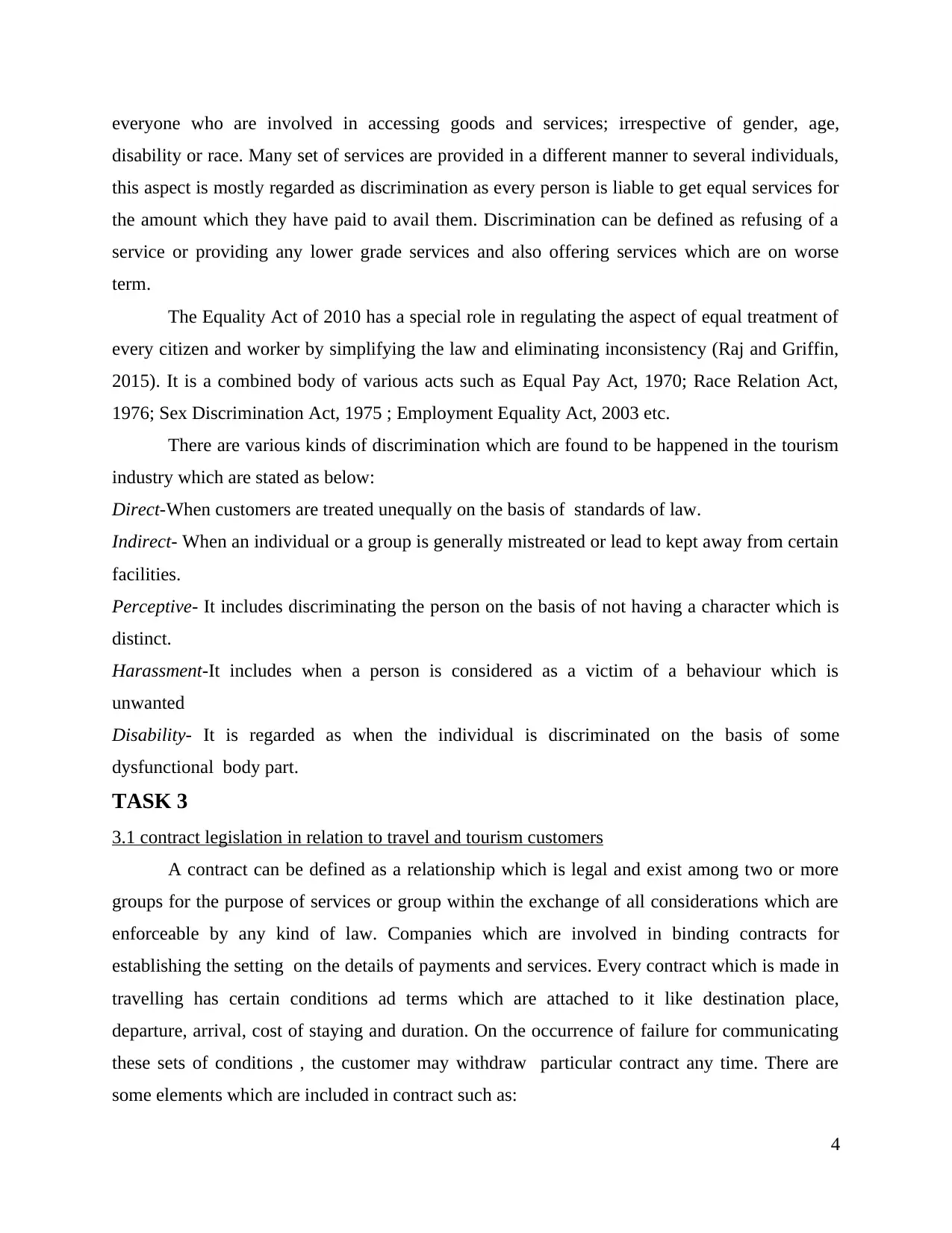
everyone who are involved in accessing goods and services; irrespective of gender, age,
disability or race. Many set of services are provided in a different manner to several individuals,
this aspect is mostly regarded as discrimination as every person is liable to get equal services for
the amount which they have paid to avail them. Discrimination can be defined as refusing of a
service or providing any lower grade services and also offering services which are on worse
term.
The Equality Act of 2010 has a special role in regulating the aspect of equal treatment of
every citizen and worker by simplifying the law and eliminating inconsistency (Raj and Griffin,
2015). It is a combined body of various acts such as Equal Pay Act, 1970; Race Relation Act,
1976; Sex Discrimination Act, 1975 ; Employment Equality Act, 2003 etc.
There are various kinds of discrimination which are found to be happened in the tourism
industry which are stated as below:
Direct-When customers are treated unequally on the basis of standards of law.
Indirect- When an individual or a group is generally mistreated or lead to kept away from certain
facilities.
Perceptive- It includes discriminating the person on the basis of not having a character which is
distinct.
Harassment-It includes when a person is considered as a victim of a behaviour which is
unwanted
Disability- It is regarded as when the individual is discriminated on the basis of some
dysfunctional body part.
TASK 3
3.1 contract legislation in relation to travel and tourism customers
A contract can be defined as a relationship which is legal and exist among two or more
groups for the purpose of services or group within the exchange of all considerations which are
enforceable by any kind of law. Companies which are involved in binding contracts for
establishing the setting on the details of payments and services. Every contract which is made in
travelling has certain conditions ad terms which are attached to it like destination place,
departure, arrival, cost of staying and duration. On the occurrence of failure for communicating
these sets of conditions , the customer may withdraw particular contract any time. There are
some elements which are included in contract such as:
4
disability or race. Many set of services are provided in a different manner to several individuals,
this aspect is mostly regarded as discrimination as every person is liable to get equal services for
the amount which they have paid to avail them. Discrimination can be defined as refusing of a
service or providing any lower grade services and also offering services which are on worse
term.
The Equality Act of 2010 has a special role in regulating the aspect of equal treatment of
every citizen and worker by simplifying the law and eliminating inconsistency (Raj and Griffin,
2015). It is a combined body of various acts such as Equal Pay Act, 1970; Race Relation Act,
1976; Sex Discrimination Act, 1975 ; Employment Equality Act, 2003 etc.
There are various kinds of discrimination which are found to be happened in the tourism
industry which are stated as below:
Direct-When customers are treated unequally on the basis of standards of law.
Indirect- When an individual or a group is generally mistreated or lead to kept away from certain
facilities.
Perceptive- It includes discriminating the person on the basis of not having a character which is
distinct.
Harassment-It includes when a person is considered as a victim of a behaviour which is
unwanted
Disability- It is regarded as when the individual is discriminated on the basis of some
dysfunctional body part.
TASK 3
3.1 contract legislation in relation to travel and tourism customers
A contract can be defined as a relationship which is legal and exist among two or more
groups for the purpose of services or group within the exchange of all considerations which are
enforceable by any kind of law. Companies which are involved in binding contracts for
establishing the setting on the details of payments and services. Every contract which is made in
travelling has certain conditions ad terms which are attached to it like destination place,
departure, arrival, cost of staying and duration. On the occurrence of failure for communicating
these sets of conditions , the customer may withdraw particular contract any time. There are
some elements which are included in contract such as:
4
Paraphrase This Document
Need a fresh take? Get an instant paraphrase of this document with our AI Paraphraser
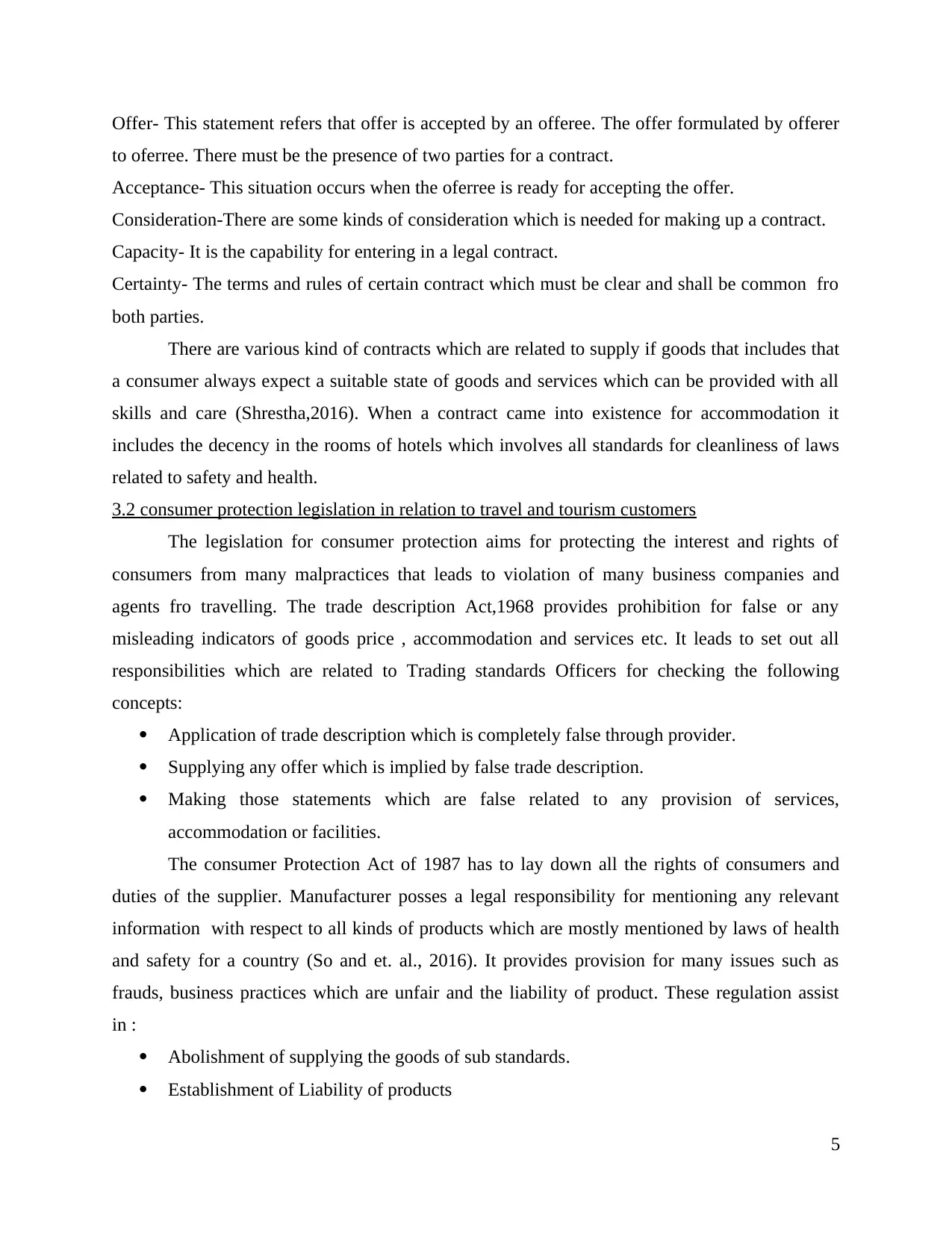
Offer- This statement refers that offer is accepted by an offeree. The offer formulated by offerer
to oferree. There must be the presence of two parties for a contract.
Acceptance- This situation occurs when the oferree is ready for accepting the offer.
Consideration-There are some kinds of consideration which is needed for making up a contract.
Capacity- It is the capability for entering in a legal contract.
Certainty- The terms and rules of certain contract which must be clear and shall be common fro
both parties.
There are various kind of contracts which are related to supply if goods that includes that
a consumer always expect a suitable state of goods and services which can be provided with all
skills and care (Shrestha,2016). When a contract came into existence for accommodation it
includes the decency in the rooms of hotels which involves all standards for cleanliness of laws
related to safety and health.
3.2 consumer protection legislation in relation to travel and tourism customers
The legislation for consumer protection aims for protecting the interest and rights of
consumers from many malpractices that leads to violation of many business companies and
agents fro travelling. The trade description Act,1968 provides prohibition for false or any
misleading indicators of goods price , accommodation and services etc. It leads to set out all
responsibilities which are related to Trading standards Officers for checking the following
concepts:
Application of trade description which is completely false through provider.
Supplying any offer which is implied by false trade description.
Making those statements which are false related to any provision of services,
accommodation or facilities.
The consumer Protection Act of 1987 has to lay down all the rights of consumers and
duties of the supplier. Manufacturer posses a legal responsibility for mentioning any relevant
information with respect to all kinds of products which are mostly mentioned by laws of health
and safety for a country (So and et. al., 2016). It provides provision for many issues such as
frauds, business practices which are unfair and the liability of product. These regulation assist
in :
Abolishment of supplying the goods of sub standards.
Establishment of Liability of products
5
to oferree. There must be the presence of two parties for a contract.
Acceptance- This situation occurs when the oferree is ready for accepting the offer.
Consideration-There are some kinds of consideration which is needed for making up a contract.
Capacity- It is the capability for entering in a legal contract.
Certainty- The terms and rules of certain contract which must be clear and shall be common fro
both parties.
There are various kind of contracts which are related to supply if goods that includes that
a consumer always expect a suitable state of goods and services which can be provided with all
skills and care (Shrestha,2016). When a contract came into existence for accommodation it
includes the decency in the rooms of hotels which involves all standards for cleanliness of laws
related to safety and health.
3.2 consumer protection legislation in relation to travel and tourism customers
The legislation for consumer protection aims for protecting the interest and rights of
consumers from many malpractices that leads to violation of many business companies and
agents fro travelling. The trade description Act,1968 provides prohibition for false or any
misleading indicators of goods price , accommodation and services etc. It leads to set out all
responsibilities which are related to Trading standards Officers for checking the following
concepts:
Application of trade description which is completely false through provider.
Supplying any offer which is implied by false trade description.
Making those statements which are false related to any provision of services,
accommodation or facilities.
The consumer Protection Act of 1987 has to lay down all the rights of consumers and
duties of the supplier. Manufacturer posses a legal responsibility for mentioning any relevant
information with respect to all kinds of products which are mostly mentioned by laws of health
and safety for a country (So and et. al., 2016). It provides provision for many issues such as
frauds, business practices which are unfair and the liability of product. These regulation assist
in :
Abolishment of supplying the goods of sub standards.
Establishment of Liability of products
5
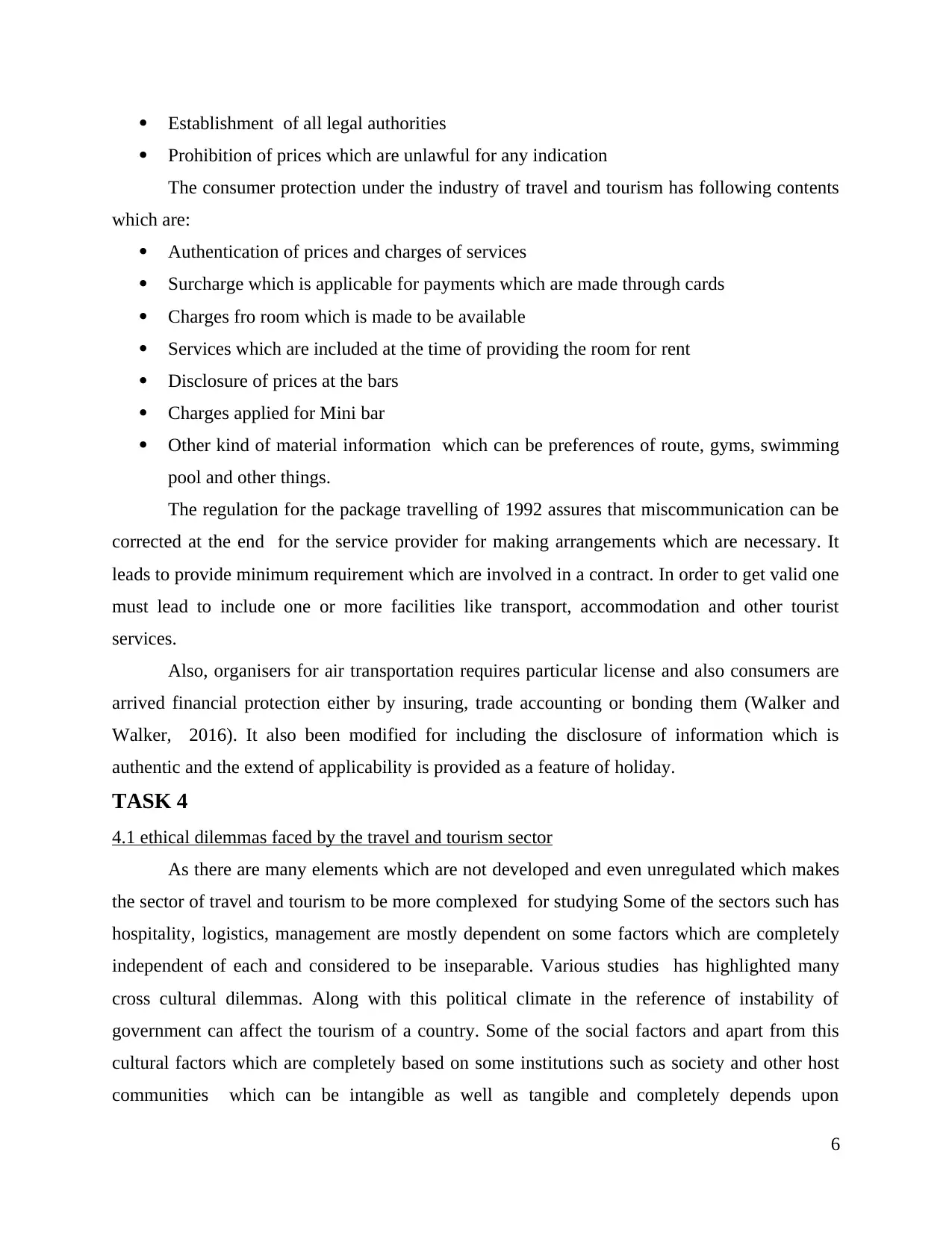
Establishment of all legal authorities
Prohibition of prices which are unlawful for any indication
The consumer protection under the industry of travel and tourism has following contents
which are:
Authentication of prices and charges of services
Surcharge which is applicable for payments which are made through cards
Charges fro room which is made to be available
Services which are included at the time of providing the room for rent
Disclosure of prices at the bars
Charges applied for Mini bar
Other kind of material information which can be preferences of route, gyms, swimming
pool and other things.
The regulation for the package travelling of 1992 assures that miscommunication can be
corrected at the end for the service provider for making arrangements which are necessary. It
leads to provide minimum requirement which are involved in a contract. In order to get valid one
must lead to include one or more facilities like transport, accommodation and other tourist
services.
Also, organisers for air transportation requires particular license and also consumers are
arrived financial protection either by insuring, trade accounting or bonding them (Walker and
Walker, 2016). It also been modified for including the disclosure of information which is
authentic and the extend of applicability is provided as a feature of holiday.
TASK 4
4.1 ethical dilemmas faced by the travel and tourism sector
As there are many elements which are not developed and even unregulated which makes
the sector of travel and tourism to be more complexed for studying Some of the sectors such has
hospitality, logistics, management are mostly dependent on some factors which are completely
independent of each and considered to be inseparable. Various studies has highlighted many
cross cultural dilemmas. Along with this political climate in the reference of instability of
government can affect the tourism of a country. Some of the social factors and apart from this
cultural factors which are completely based on some institutions such as society and other host
communities which can be intangible as well as tangible and completely depends upon
6
Prohibition of prices which are unlawful for any indication
The consumer protection under the industry of travel and tourism has following contents
which are:
Authentication of prices and charges of services
Surcharge which is applicable for payments which are made through cards
Charges fro room which is made to be available
Services which are included at the time of providing the room for rent
Disclosure of prices at the bars
Charges applied for Mini bar
Other kind of material information which can be preferences of route, gyms, swimming
pool and other things.
The regulation for the package travelling of 1992 assures that miscommunication can be
corrected at the end for the service provider for making arrangements which are necessary. It
leads to provide minimum requirement which are involved in a contract. In order to get valid one
must lead to include one or more facilities like transport, accommodation and other tourist
services.
Also, organisers for air transportation requires particular license and also consumers are
arrived financial protection either by insuring, trade accounting or bonding them (Walker and
Walker, 2016). It also been modified for including the disclosure of information which is
authentic and the extend of applicability is provided as a feature of holiday.
TASK 4
4.1 ethical dilemmas faced by the travel and tourism sector
As there are many elements which are not developed and even unregulated which makes
the sector of travel and tourism to be more complexed for studying Some of the sectors such has
hospitality, logistics, management are mostly dependent on some factors which are completely
independent of each and considered to be inseparable. Various studies has highlighted many
cross cultural dilemmas. Along with this political climate in the reference of instability of
government can affect the tourism of a country. Some of the social factors and apart from this
cultural factors which are completely based on some institutions such as society and other host
communities which can be intangible as well as tangible and completely depends upon
6
⊘ This is a preview!⊘
Do you want full access?
Subscribe today to unlock all pages.

Trusted by 1+ million students worldwide
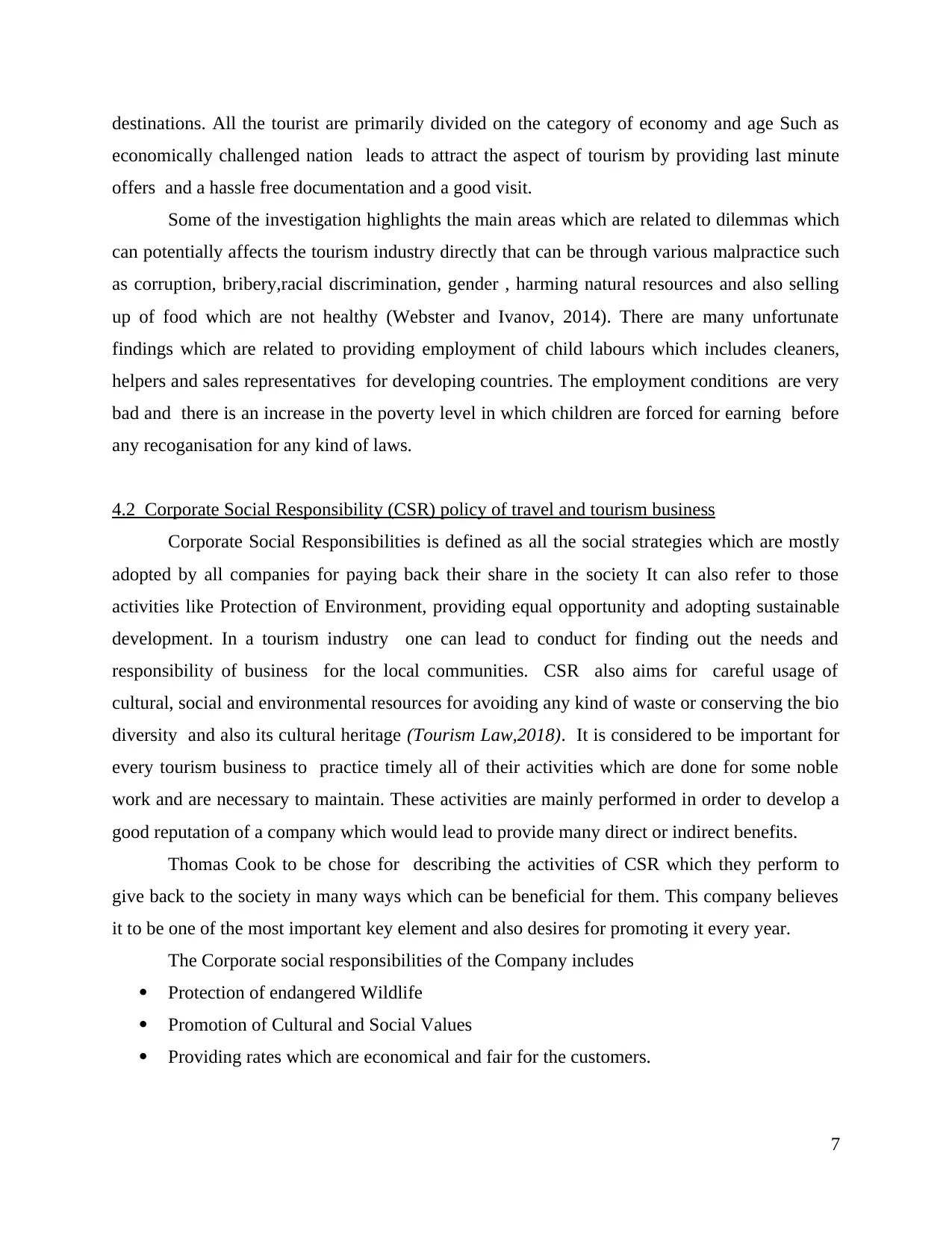
destinations. All the tourist are primarily divided on the category of economy and age Such as
economically challenged nation leads to attract the aspect of tourism by providing last minute
offers and a hassle free documentation and a good visit.
Some of the investigation highlights the main areas which are related to dilemmas which
can potentially affects the tourism industry directly that can be through various malpractice such
as corruption, bribery,racial discrimination, gender , harming natural resources and also selling
up of food which are not healthy (Webster and Ivanov, 2014). There are many unfortunate
findings which are related to providing employment of child labours which includes cleaners,
helpers and sales representatives for developing countries. The employment conditions are very
bad and there is an increase in the poverty level in which children are forced for earning before
any recoganisation for any kind of laws.
4.2 Corporate Social Responsibility (CSR) policy of travel and tourism business
Corporate Social Responsibilities is defined as all the social strategies which are mostly
adopted by all companies for paying back their share in the society It can also refer to those
activities like Protection of Environment, providing equal opportunity and adopting sustainable
development. In a tourism industry one can lead to conduct for finding out the needs and
responsibility of business for the local communities. CSR also aims for careful usage of
cultural, social and environmental resources for avoiding any kind of waste or conserving the bio
diversity and also its cultural heritage (Tourism Law,2018). It is considered to be important for
every tourism business to practice timely all of their activities which are done for some noble
work and are necessary to maintain. These activities are mainly performed in order to develop a
good reputation of a company which would lead to provide many direct or indirect benefits.
Thomas Cook to be chose for describing the activities of CSR which they perform to
give back to the society in many ways which can be beneficial for them. This company believes
it to be one of the most important key element and also desires for promoting it every year.
The Corporate social responsibilities of the Company includes
Protection of endangered Wildlife
Promotion of Cultural and Social Values
Providing rates which are economical and fair for the customers.
7
economically challenged nation leads to attract the aspect of tourism by providing last minute
offers and a hassle free documentation and a good visit.
Some of the investigation highlights the main areas which are related to dilemmas which
can potentially affects the tourism industry directly that can be through various malpractice such
as corruption, bribery,racial discrimination, gender , harming natural resources and also selling
up of food which are not healthy (Webster and Ivanov, 2014). There are many unfortunate
findings which are related to providing employment of child labours which includes cleaners,
helpers and sales representatives for developing countries. The employment conditions are very
bad and there is an increase in the poverty level in which children are forced for earning before
any recoganisation for any kind of laws.
4.2 Corporate Social Responsibility (CSR) policy of travel and tourism business
Corporate Social Responsibilities is defined as all the social strategies which are mostly
adopted by all companies for paying back their share in the society It can also refer to those
activities like Protection of Environment, providing equal opportunity and adopting sustainable
development. In a tourism industry one can lead to conduct for finding out the needs and
responsibility of business for the local communities. CSR also aims for careful usage of
cultural, social and environmental resources for avoiding any kind of waste or conserving the bio
diversity and also its cultural heritage (Tourism Law,2018). It is considered to be important for
every tourism business to practice timely all of their activities which are done for some noble
work and are necessary to maintain. These activities are mainly performed in order to develop a
good reputation of a company which would lead to provide many direct or indirect benefits.
Thomas Cook to be chose for describing the activities of CSR which they perform to
give back to the society in many ways which can be beneficial for them. This company believes
it to be one of the most important key element and also desires for promoting it every year.
The Corporate social responsibilities of the Company includes
Protection of endangered Wildlife
Promotion of Cultural and Social Values
Providing rates which are economical and fair for the customers.
7
Paraphrase This Document
Need a fresh take? Get an instant paraphrase of this document with our AI Paraphraser
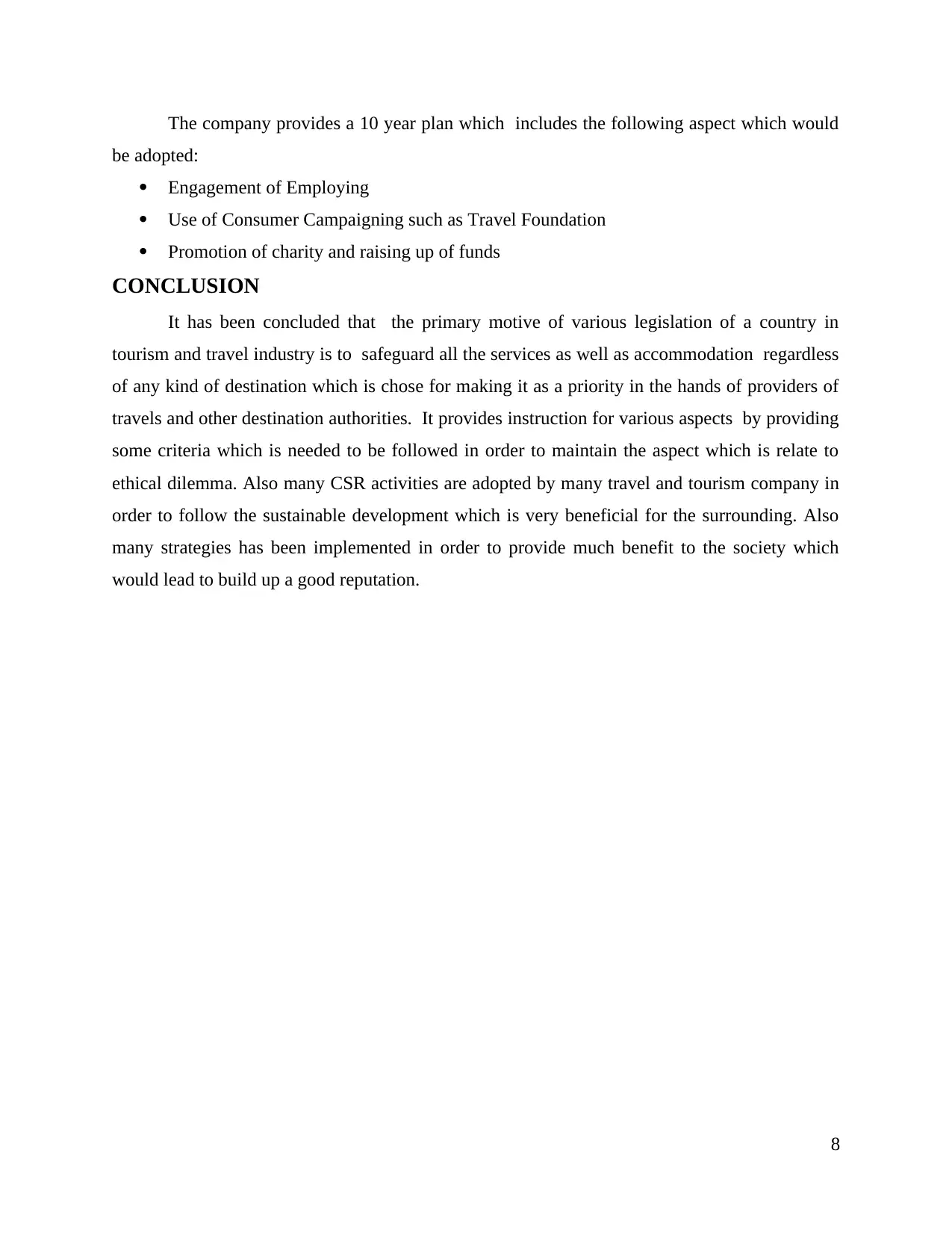
The company provides a 10 year plan which includes the following aspect which would
be adopted:
Engagement of Employing
Use of Consumer Campaigning such as Travel Foundation
Promotion of charity and raising up of funds
CONCLUSION
It has been concluded that the primary motive of various legislation of a country in
tourism and travel industry is to safeguard all the services as well as accommodation regardless
of any kind of destination which is chose for making it as a priority in the hands of providers of
travels and other destination authorities. It provides instruction for various aspects by providing
some criteria which is needed to be followed in order to maintain the aspect which is relate to
ethical dilemma. Also many CSR activities are adopted by many travel and tourism company in
order to follow the sustainable development which is very beneficial for the surrounding. Also
many strategies has been implemented in order to provide much benefit to the society which
would lead to build up a good reputation.
8
be adopted:
Engagement of Employing
Use of Consumer Campaigning such as Travel Foundation
Promotion of charity and raising up of funds
CONCLUSION
It has been concluded that the primary motive of various legislation of a country in
tourism and travel industry is to safeguard all the services as well as accommodation regardless
of any kind of destination which is chose for making it as a priority in the hands of providers of
travels and other destination authorities. It provides instruction for various aspects by providing
some criteria which is needed to be followed in order to maintain the aspect which is relate to
ethical dilemma. Also many CSR activities are adopted by many travel and tourism company in
order to follow the sustainable development which is very beneficial for the surrounding. Also
many strategies has been implemented in order to provide much benefit to the society which
would lead to build up a good reputation.
8
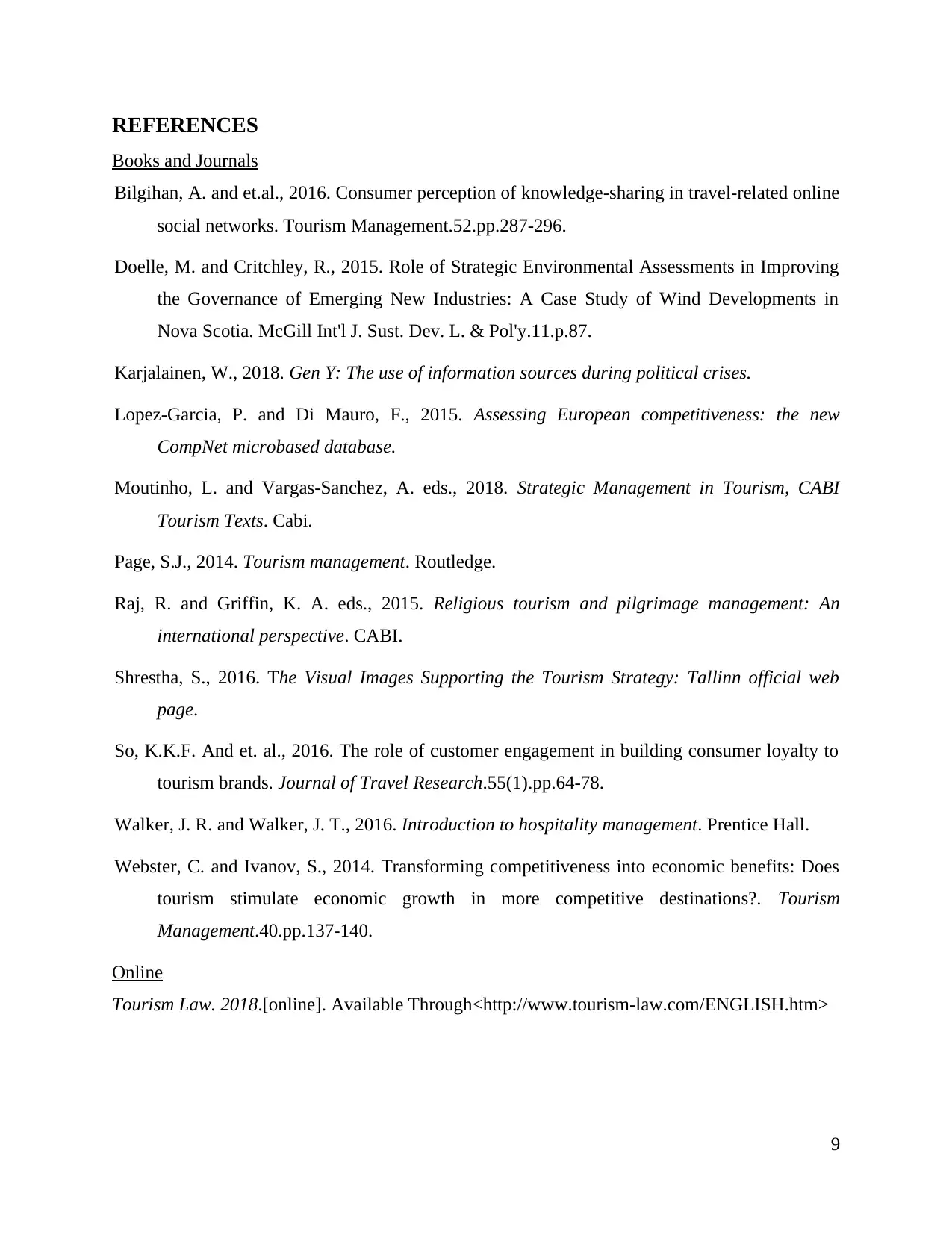
REFERENCES
Books and Journals
Bilgihan, A. and et.al., 2016. Consumer perception of knowledge-sharing in travel-related online
social networks. Tourism Management.52.pp.287-296.
Doelle, M. and Critchley, R., 2015. Role of Strategic Environmental Assessments in Improving
the Governance of Emerging New Industries: A Case Study of Wind Developments in
Nova Scotia. McGill Int'l J. Sust. Dev. L. & Pol'y.11.p.87.
Karjalainen, W., 2018. Gen Y: The use of information sources during political crises.
Lopez-Garcia, P. and Di Mauro, F., 2015. Assessing European competitiveness: the new
CompNet microbased database.
Moutinho, L. and Vargas-Sanchez, A. eds., 2018. Strategic Management in Tourism, CABI
Tourism Texts. Cabi.
Page, S.J., 2014. Tourism management. Routledge.
Raj, R. and Griffin, K. A. eds., 2015. Religious tourism and pilgrimage management: An
international perspective. CABI.
Shrestha, S., 2016. The Visual Images Supporting the Tourism Strategy: Tallinn official web
page.
So, K.K.F. And et. al., 2016. The role of customer engagement in building consumer loyalty to
tourism brands. Journal of Travel Research.55(1).pp.64-78.
Walker, J. R. and Walker, J. T., 2016. Introduction to hospitality management. Prentice Hall.
Webster, C. and Ivanov, S., 2014. Transforming competitiveness into economic benefits: Does
tourism stimulate economic growth in more competitive destinations?. Tourism
Management.40.pp.137-140.
Online
Tourism Law. 2018.[online]. Available Through<http://www.tourism-law.com/ENGLISH.htm>
9
Books and Journals
Bilgihan, A. and et.al., 2016. Consumer perception of knowledge-sharing in travel-related online
social networks. Tourism Management.52.pp.287-296.
Doelle, M. and Critchley, R., 2015. Role of Strategic Environmental Assessments in Improving
the Governance of Emerging New Industries: A Case Study of Wind Developments in
Nova Scotia. McGill Int'l J. Sust. Dev. L. & Pol'y.11.p.87.
Karjalainen, W., 2018. Gen Y: The use of information sources during political crises.
Lopez-Garcia, P. and Di Mauro, F., 2015. Assessing European competitiveness: the new
CompNet microbased database.
Moutinho, L. and Vargas-Sanchez, A. eds., 2018. Strategic Management in Tourism, CABI
Tourism Texts. Cabi.
Page, S.J., 2014. Tourism management. Routledge.
Raj, R. and Griffin, K. A. eds., 2015. Religious tourism and pilgrimage management: An
international perspective. CABI.
Shrestha, S., 2016. The Visual Images Supporting the Tourism Strategy: Tallinn official web
page.
So, K.K.F. And et. al., 2016. The role of customer engagement in building consumer loyalty to
tourism brands. Journal of Travel Research.55(1).pp.64-78.
Walker, J. R. and Walker, J. T., 2016. Introduction to hospitality management. Prentice Hall.
Webster, C. and Ivanov, S., 2014. Transforming competitiveness into economic benefits: Does
tourism stimulate economic growth in more competitive destinations?. Tourism
Management.40.pp.137-140.
Online
Tourism Law. 2018.[online]. Available Through<http://www.tourism-law.com/ENGLISH.htm>
9
⊘ This is a preview!⊘
Do you want full access?
Subscribe today to unlock all pages.

Trusted by 1+ million students worldwide
1 out of 13
Related Documents
Your All-in-One AI-Powered Toolkit for Academic Success.
+13062052269
info@desklib.com
Available 24*7 on WhatsApp / Email
![[object Object]](/_next/static/media/star-bottom.7253800d.svg)
Unlock your academic potential
Copyright © 2020–2025 A2Z Services. All Rights Reserved. Developed and managed by ZUCOL.




